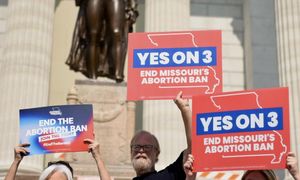Chaos disrupted the calm of Arizona's Election Day as bomb threats were reported at four polling sites, particularly targeting Navajo County. On November 5, 2024, these threats captured attention not just locally but nationally, with officials linking them to seemingly coordinated efforts with foreign intent.
According to reports from the Arizona Secretary of State Adrian Fontes, the bomb threats were deemed unsubstantiated yet no detail was spared about their seriousness. Fontes confirmed, "We have no reason to believe any voters or polling places are in jeopardy," reassuring the public as fears began to mount.
The FBI stepped forward, declaring the threats were coming from email domains associated with Russia. They stated, "Several states" have been targeted and labeled the threats as part of what they believe to be manipulated tactics aimed at inciting fear rather than actual physical harm. Most notable was the detail of them originating from .ru email addresses, which sparked speculation and concern about international interference.
Despite the alarming nature of these threats, Fontes stated the polling locations remained open, nary a voter deterred from casting ballots during this sensitive time. “Election Day is going very well across most of the state,” Fontes announced, countering the narrative of impending chaos. The threats resulted in no closures or restrictions.
Unpacking the possible motivations behind these alarming communications, Fontes suggested chaos and confusion were the goal rather than influencing the political results of the election itself. He elaborated, "We do, we believe, this is to invoke chaos and trying to get us to rattle in our boots." This sentiment echoed broader concerns of election integrity and safety across the United States.
A similar pattern emerged across other battleground states, including Georgia and Wisconsin, where polling locations were also targeted with threats, none of which were considered credible. The intimidation tactics appeared synchronized, providing insight to authorities about underlying strategies aimed at tampering with the electoral process.
Fontes mentioned his discussions with counterparts from affected states were more about sharing experiences than substantive information, as law enforcement agencies collaborated to probe these threats. “It is going to be a busy evening, folks,” he quipped, highlighting the seriousness of the situation and the need for continuous vigilance.
The Election Day backdrop was particularly acute within Navajo County, where concerns loomed large about security and the health of the democratic process. Historically, Native American voters have faced numerous obstacles when it came to accessing polling places, and the sudden wave of threats only compounded existing tensions. Local leaders expressed their determination for voter rights and the importance of participation.
Media speculation suggested these threats might not come directly from the Russian government but could represent nefarious actors using Russian domains to cloak their identities. This raised questions on how best to secure the challenge of foreign influence and safeguard elections amid the continuous evolution of internal and external threats.
This paradigm of interference wasn't simply felt through bomb threats but extended to social media campaigns and misinformation. Authorities strived to assure voters of their safety, with Fontes noting, "The motive appears to ensue chaos, not to impact any political outcome." For many, these sentiments only heightened the necessity for stronger protective measures around elections, both locally and nationwide.
The situation echoed broader issues of election integrity, as officials across the nation continued to navigate the complex currents of political unrest and foreign interference. Despite these distractions, many Arizona voters remained resolute, with Election Day proceeding without major incident, illustrating the spirit of democracy under pressure.
With evidence pointing toward nationwide trends of similar bomb threats, the significance of addressing the issue became clear. Authorities must act swiftly not just to respond to the immediate threats, but to anticipate the broader ramifications of such tactics meant to sow discord among the populace.
Overall, Arizona's leaders were compelled to blend urgency with clarity as they responded to the chaotic narrative spun by threats. Their message was clear: voters should remain vigilant but undeterred, as Arizona’s pulse continued to beat strongly through the tumult of the election process. "We are aware there have been threats made not just in Arizona, but Georgia, Minnesota, Michigan, and Wisconsin," Fontes provided, underscoring the national scale of the issue and the shared resolve against these attacks.
Above all, Arizona's community of voters took to the polls undeterred, embodying the principles of democracy even when faced with contemptible acts meant to intimidate. This reaffirmation of public spirit would challenge threats head-on, offering hope not only for Arizona but for broader civil engagement across the nation.



